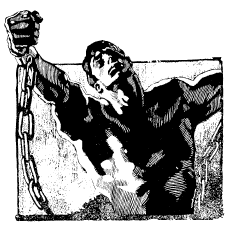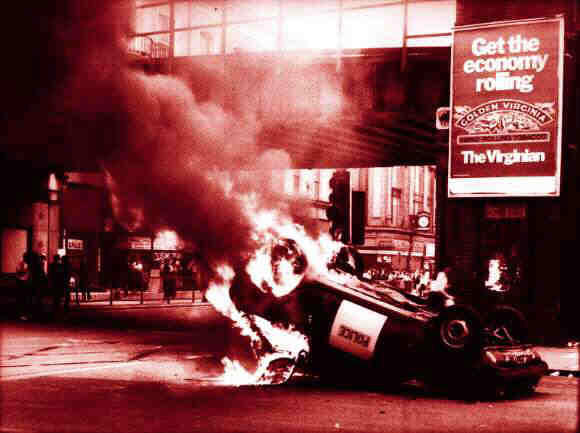|
Since the dawn of
human history, when our ancestors first migrated into cities and
established distinctive societies, certain predicaments have inevitably
plagued all civilizations. Though war, disease, and famine have all played
their part in modifying the ebb and flow of history, some of the most
significant revolutions and movements in history have occurred because the
poor, downtrodden masses are forced to endure harsh, unreasonable, and
ultimately cruel measures at the hands of the corrupt establishment. In
the twentieth century, as mass media came to fruition, music became an
increasingly popular mode of influencing both ‘the Man’ and his victims.
But even though social movements may be separated by geography, time, and
style of music, their penultimate messages resound across these boundaries
to enact change and reform.
 In the early
twentieth century, labor disputes were coming to a head. Aggravated by
poor conditions, low wages, and oppressive management, the American
proletariat was turning toward radical groups like the Industrial Workers
of the World. The IWW, or the Wobblies, as they were commonly called,
urged a massive class war that would ultimately end with the complete
overthrow of the petty bourgeois. One of the chief mediums for spreading
the IWW’s message of content was song. Because the heyday of the Wobblies’
struggle took place before the proliferation of radio, they relied on
contracted singer/songwriters to write fiery ballads of revolution and
would then print the lyrics and music and distribute them for a small fee,
simultaneously spreading the word and raising precious funds. In the early
twentieth century, labor disputes were coming to a head. Aggravated by
poor conditions, low wages, and oppressive management, the American
proletariat was turning toward radical groups like the Industrial Workers
of the World. The IWW, or the Wobblies, as they were commonly called,
urged a massive class war that would ultimately end with the complete
overthrow of the petty bourgeois. One of the chief mediums for spreading
the IWW’s message of content was song. Because the heyday of the Wobblies’
struggle took place before the proliferation of radio, they relied on
contracted singer/songwriters to write fiery ballads of revolution and
would then print the lyrics and music and distribute them for a small fee,
simultaneously spreading the word and raising precious funds.
Among the most
famous of these hired lyricists was Joe Hill, a Swedish immigrant whose
ballads emphasized the labor struggle with their caustic edge. Hill
achieved national notoriety when he was executed for a murder in Utah,
having been quickly tried and killed on extremely circumstantial evidence.
The IWW promoted him as a martyr of the cause and sales of his songs
increased substantially. Hill’s most famous song, “The Preacher and the
Slave” is a parody of “In the Sweet Bye and Bye,” a popular hymn that
promises eternal rewards for earthly piety and support of the church.
Hill’s version contained many sardonic puns, even referring once to the
Salvation Army as “the starvation army.” At the end of “The Preacher and
the Slave,” Hill, in line with the IWW’s goals, encourages a radical
revolution, urging “the workingfolk of all countries” to unite against
their oppressors and fight “side by side” for the “world and its wealth.”
Such a radical,
combative message was hardly uncommon. Indeed the IWW’s constitution
states that “between these two classes a struggle must go on until the
workers of the world organize…take possession…and live in harmony with the
world.” This militant message would ultimately lead the IWW into trouble
with the government and an eventually decline, but the struggle for
economic and social equality has continued in its absence.
In the late 1970s, a
new musical revolution was occurring in England. Fed up with the
commercialization of rock and roll, social outcasts collectively known as
the punks began to experiment with new types of music, creating a sound
that was wholly unique and anti-establishment. Punk has its roots in the
sound of bands like the Kinks and the Who, with explosive anthems like “My
Generation,” which emphasized youth culture and passion with lyrics like
“I hope I die before I get old.” By the time true punk materialized in the
Seventies, bands like the Ramones and the Sex Pistols were leading the
revolution. However, it was the Clash that would come to truly epitomize
the punk ideal and attitude, achieving their iconic status with their 1979
album London Calling. The album, with its legendary cover of
bassist Paul Simonon smashing his bass guitar, successfully fused the
Clash’s politically charged punk with a variety of world beats. This
blending of punk and reggae produced one of the most well known tracks off
of the double album, “The Guns of Brixton.”
“The Guns of
Brixton” refers to building social unrest in London in the late seventies
and early eighties. Brixton is a neighborhood in southern London which is
overwhelmingly poor, overcrowded, and rife with both crime and an inherent
distrust of law enforcement. In response to the abundance of crime, police
forces began to enforce an obscure segment of an 1824 law to accost and
arrest individuals based solely on the suspicion to commit a crime. These
codes, commonly referred to as the “sus laws” resulted in a massive
violation of civil liberties and due process. As a result of the economic
conditions and police harassment, Brixton became a volatile powerkeg
waiting to explode.
In the song,
writer/bassist Paul Simonon takes a similar approach to Joe Hill, urging
revolt against the sus laws. However, Simonon’s lyrics lack Hill’s cynical
humor. Instead, the Clash song is full of a fiery rage. Simonon demands
listeners make a choice:
“When they kick in
your front door
How you gonna come
With your hands on
your head
Or on the trigger of
your gun?”
Simonon presents a
bleak decision – either comply with the unjust sus laws or die in a hail
of bullets, “shot down on the pavement.”
He shares this
retaliatory sentiment with Hill. Both writers are fermenting rebellion
among the lower classes, the downtrodden, oppressed proletariat. Hill and
Simonon both specify a target; in “The Preacher and the Slave,” hill
targets the bourgeois grafters and the “starvation army” while Simonon
attacks “the law,” the policemen enforcing the unfair statutes. Each song
is harshly critical of the establishment for their complicity in the
problem at hand.
However, for all of
their similarities, “The Guns of Brixton” and “The Preacher and the Slave”
are two very different songs. The most obvious difference is the style of
music. “The Preacher and the Slave” is a traditional folk hymn. It is
designed to be sung a capella or with only an acoustic guitar
accompanying. “The Guns of Brixton” is a completely different affair. It
is a punk song, a genre which endorses anti-establishment beliefs and
attacks the traditional. The song possesses a Jamaican influenced reggae
beat with a prominent bass-line and reggae-style upstrokes on the guitar.
In addition to
differences in style, the two songs, though they possess similar prognosis
and motivation, differed in results. Though the IWW was fairly militant
and known for inciting riots, “The Preacher and the Slave” held a more
broad target and objective, one that would never see fruition in the
United States. “The Guns of Brixton” however continued to stir unrest and
discontent in Brixton, which erupted into the most vicious riots
Britain
had ever seen and sparked further rioting on a national scale. These riots
ultimately resulted in the repeal of the hated sus laws.
Though Joe Hill and
the Clash wrote and performed very different types of music in very
different eras, the two share common, universal elements. Both songs deal
with a universal human condition and suggest similar ways of fixing the
situation. For all their differences in style and result, “The Guns of
Brixton” is a spiritual successor of sorts to Joe Hill’s classic protest
music.
|